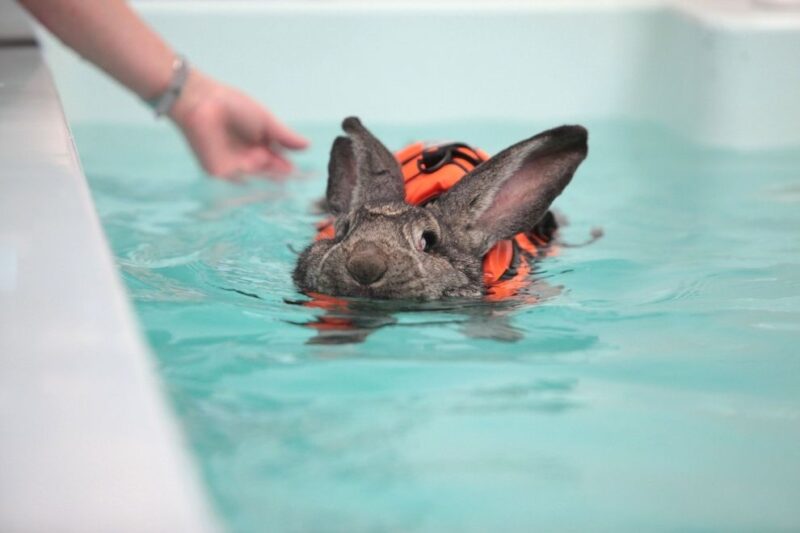Can Rabbits Swim? Is It Safe
Rabbits are one of the cutest animals on the planet. Their fluffy bodies and petite, cute builds also make them a great choice for pets. If you’re thinking of getting a pet rabbit, you’re probably wondering how they would fare in the pool. Can rabbits swim? Do rabbits like swimming? Is it safe for rabbits to swim?
Can Rabbits Swim?
In short, the answer is yes – rabbits can swim, but it’s a little more complicated than that. Rabbits do have the ability to swim. They can do more than just bounce around all day, but the real question is, do they like to swim? This is where things get more complicated.
Rabbits can swim, but they mostly do so to avoid predators. This means that you’ll see wild rabbits swimming far more frequently than you’ll see a pet bunny swimming. While rabbits can swim, they are not great swimmers and prefer to run.
Although you may have heard or read that rabbits enjoy swimming, the vast majority of bunnies are unable to tolerate being submerged in water. If this is done to them, they may experience trauma and shock.
Because we can’t really ask a bunny if she likes swimming, the best we can do is understand her point of view by observing her daily life. So a bunny spends her entire life looking for clean and dry bedding. They are kept safe from environmental elements such as rain and snow. We don’t want our rabbits to stay in wet bedding, and we don’t let them get soaked in rain. Similarly, we cannot allow them to soak in water.
Is It Safe For Rabbits To Swim?

Swimming can be dangerous for pet rabbits, especially when they are put into a pool; their fluff absorbs water like a sponge. Have you ever tried swimming (or being pushed into a pool) in wet clothes?
The feeling is similar to that of rabbits as water is absorbed into their wet fur. This makes them feel heavy, and swimming is difficult and exhausting. Rabbit owners (or parents we prefer) are better off keeping their pet rabbits out of the pool.
Domesticated rabbits do not dry out easily once they get wet. Remember the feeling of walking into an air-conditioned home after a swim? They feel that way long after the game and it’s another reason why they avoid going to the pool.
Do Rabbits Like to Swim?
Different breeds of domestic rabbits have different swimming tendencies. For example, our Flemish Giant Rabbit absolutely hates getting wet, while our close friend Belgian Rabbit absolutely loves playing in puddles.
But in general, most rabbits don’t like swimming. Their plush coats absorb a lot of moisture, making it feel like swimming in a dress or suit — definitely not a fun experience. Combined with the difficulty in regulating body temperature, swimming can be a very stressful activity for rabbits.
Can Rabbits Swim In The Sea?
Because rabbits can swim in the water, whether we’re talking about rivers, streams, lakes, or oceans, rabbits can swim there.
However, even the clearest natural bodies of water are full of elements unrelated to the environment of a domestic rabbit.
In the sea, you’re exposing your rabbit to a variety of creatures, such as fish, crabs, or snakes, and your pet rabbit isn’t ready to defend itself, especially when swimming.
Also consider things you can’t see in the water, such as water-borne parasites under a microscope. Any amount of these can easily get into a rabbit’s ears, eyes, mouth, or nose, let alone get trapped in the fur and skin.
Should You Put Your Bunny in a Swimming Pool?
Under no circumstances should you let your rabbit play in the chlorinated water of a swimming pool! Chlorine is a serious irritant to rabbit skin. What’s more, most outdoor pools don’t have the ability for your rabbit to crawl out on its own — which can lead to a nervous and dangerous fear response when your rabbit tries to get out of the water.
Final Thoughts
Can rabbits swim? The answer is yes, they can, but they probably shouldn’t. Some people say that putting rabbits in a pool is cruel to animals because they are vulnerable when it’s cold and wet, and their body systems are fragile. If possible, keep your rabbit out of the pool.
Read more about:
